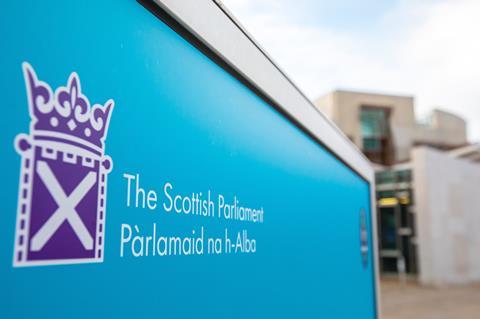New legislation could cap rent increases and minimise evictions
The Housing (Scotland) Bill, which aims to improve the private renting experience for tenants and prevent homelessness, has passed its first stage in the Scottish Parliament.

Changes to the current law would cap rent increases at CPI+1% up to a maximum of 6% and introduce a system of rent controls to tackle poverty and protect against eviction.
The new rights would also allow tenants to request to keep pets and decorate their rented homes.
The proposed legislation encompasses the ‘ask and act’ duty, requiring social landlords, health boards, police and other public bodies to ask about a person’s housing situation and take action to prevent homelessness.
It would also provide additional protection to people in social housing who experience domestic abuse by allowing landlords to apply to the court to end the tenancy rights of someone who has been abusive to their partner or ex-partner.
Housing minister Paul McLennan said: “The Housing (Scotland) Bill will play an important role in helping to tackle poverty by keeping rents affordable and ensuring people can stay in their homes.
“Ensuring everyone has the right to a safe and stable home is essential to the Scottish Government’s priority of ending child poverty and the Bill will play a role in reaching that goal.”
However, the bill has received some criticism from investors and landlords, with the Scottish Property Federation (SPF) arguing that it fails to address the “lack of new investment and availability of homes to rent.”
David Melhuish, director of the Scottish Property Federation, said: “Put simply there is a huge imbalance in the market with too much demand for too few homes. This is being compounded by declining supply, with Scottish build-to-rent constructions falling by some 45% compared to the same time last year.
“To address this the government needs to go further to restore investor confidence in Scotland and to unlock at least £2.5bn in direct investment, kick start some 15,000 homes at various stages of planning, and even more added value for the wider economy.”
While CIH Scotland said it supports the decision to take the bill to Stage 2 where amendments will be considered, it is unsure how effectively the government will be enforcing change.
>>See also: Scottish Housing Regulator proposes three new damp and mould performance indicators for social landlords
>>See also: Scottish government to launch ‘planning hub’ in the new year
Its policy and practice manager, Ashley Campbell, said: “The homelessness prevention and domestic abuse measures have the potential to change Scotland’s approach to homelessness services – to focus more on prevention and to formalise the vital role of partners.
“However, if these measures are to be effective, they must be fully resourced and underpinned by clear guidance developed in partnership with the organisations expected to deliver them.
“Our concerns with the rent control proposals remain. Of course, we want to see rights strengthened and affordability improved, but the provisions will not achieve this without robust regulatory structures in place to support good practice and proactively enforce the rules. The current system relies far too much on tenants to police the sector and to challenge poor behaviour when they may not have the confidence to do so.”











No comments yet